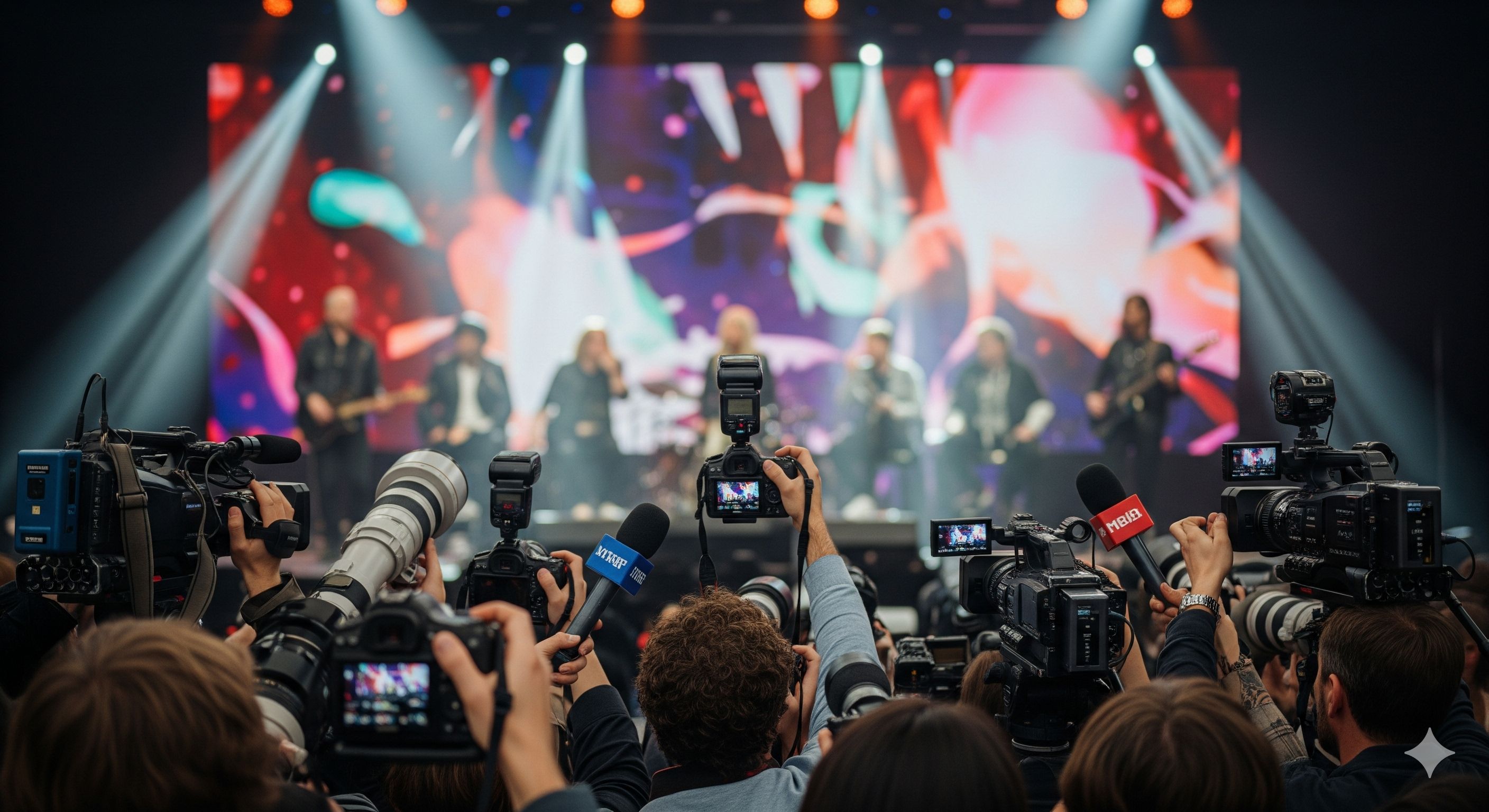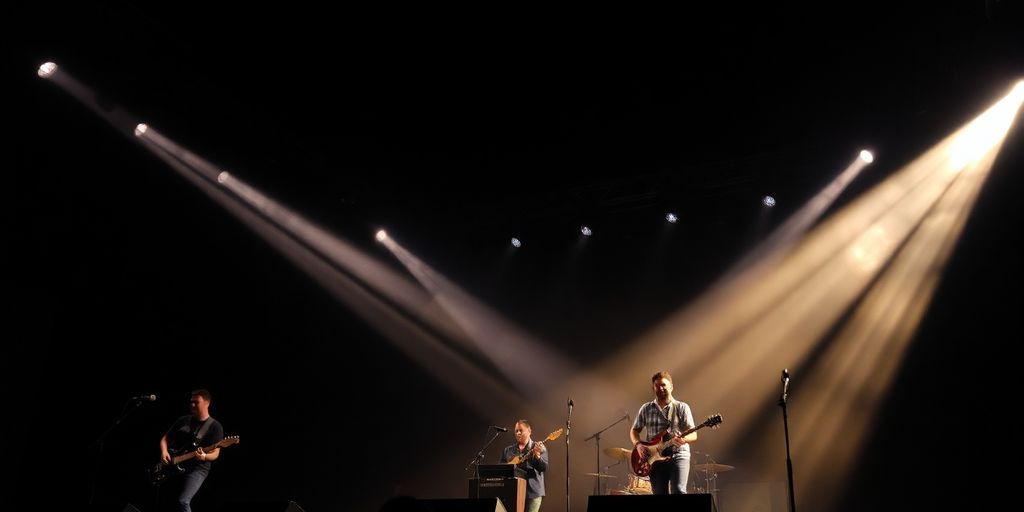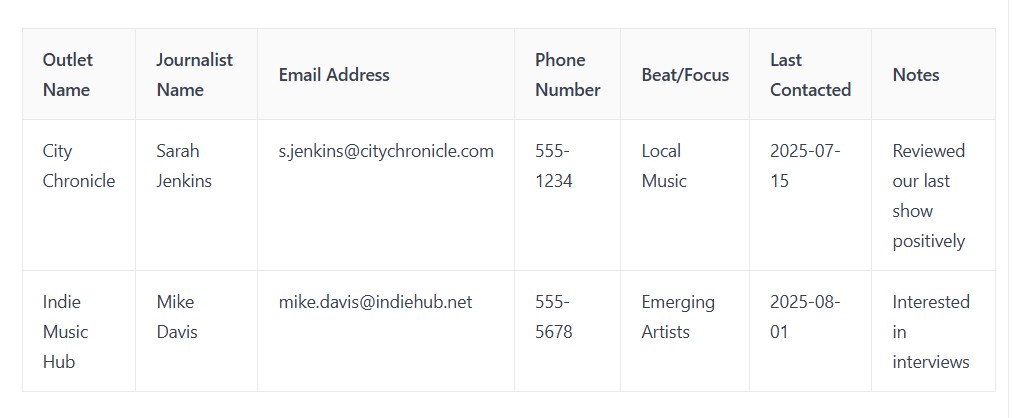Register as an organizer
Click the button below and finish your organizer registration, or fill out the form and we will be in touch to assist you.

So, you've got a killer concert coming up and you want people to know about it. That's where a good press release comes in. Think of it as your ticket to getting other people talking about your show. But honestly, sending out a bunch of emails hoping for the best isn't really the way to go. Journalists get swamped with these things every single day. You need to make sure yours actually gets read and, more importantly, makes them want to cover your event. It’s not just about announcing a show; it’s about telling a story they can use.

When you're trying to get the word out about a concert, a press release is your main tool. Think of it like this, journalists get tons of these things every single day, so yours needs to be clear, direct, and give them everything they need right away. If it's confusing or buried in fluff, it's probably just going to get ignored.
The title is your first, and sometimes only, chance to grab a journalist's attention. It needs to be more than just the band name and date. What's the hook? Is it a rare reunion show, a unique venue, or a special guest? Make the title tell a mini-story that makes them want to read more. Something like "Local Indie Darlings 'The Wandering Souls' Return for One Night Only" is way better than just "The Wandering Souls Concert."
Journalists are busy. They don't have time to decipher flowery language or marketing jargon. Get straight to the point. Use clear, everyday words. Avoid stuffing your release with adjectives that don't add real information. Think about what a journalist needs to know to write a story, not what you want to brag about.
This is non-negotiable. Your press release needs to answer the basic questions immediately, Who is performing? What kind of music is it? When is the show? Where is it happening? Why should people care? And sometimes, how can people get tickets? If any of these are missing, the journalist will have to do extra work, and they might not bother.
Here's a quick checklist:
So, you've got this killer concert, right? The music's tight, the venue's booked, and you're ready to rock. But how do you get the word out to the people who can actually make a difference? It all starts with figuring out who to send your press release to. Sending it to every single journalist you can find is like shouting into the void, mostly ineffective and a waste of your time.
Think about it: a local music blog is probably more interested in your indie band's upcoming gig than a national business journal. You need to be smart about this. Start by listing out the types of media that cover live music in your area or genre. This could include:
The goal is to find outlets whose readers or listeners are likely to be interested in your concert. It’s about quality over quantity. A few well-chosen contacts who are genuinely interested will get you much further than a hundred who will just delete your email. You can often find these by looking at who has covered similar artists or events in the past. For example, if you're promoting a folk artist, look for who reviewed that other folk act that came through town last month. It's a bit of detective work, but it pays off. You might even find some great niche publications that are perfect for your specific event, like those focusing on specific music genres.
Once you start identifying potential contacts, you need a system to keep track of them. A simple spreadsheet is your best friend here. Don't just dump names in; organize it. Here’s what you should include:

Keeping this updated is key. When you send out a release, note the date. If you get a response, note that too. This helps you avoid contacting the same person too often and shows you’re organized when you do reach out. It also helps you remember who responded well to your previous pitches, so you can prioritize them.
Journalists aren't just looking for information; they're looking for a story. Your press release needs to give them something compelling to write about. What's the unique angle for your concert? Is it a reunion of a beloved local band? A debut performance of a new artist? A charity event?
Think about what makes your concert newsworthy. What's the hook that will grab a reader's attention and make them want to know more? It's not just about announcing a show; it's about telling a story that fits their audience.
Different journalists will also have different needs. A TV crew might want a soundbite from the band, while a print journalist might want a more in-depth interview. A blogger might just need a few good photos and a quick summary. Tailor your follow-up and the information you offer based on what you know about the outlet and the journalist. Being considerate of their time and needs is how you build those important relationships that lead to consistent coverage.
When you're sending out information about a concert, you've got to make it easy for journalists to do their job. They're busy people, getting tons of emails every day. So, your press release needs to be clear, packed with the right stuff, and simple to use. Think of it as giving them all the ingredients for a good story without making them hunt for them.
Forget about fancy fonts or a million colors. What journalists really want are good photos and maybe a poster if it looks professional. These visuals help them tell the story. Make sure the pictures are clear and not too big, so they don't clog up an email. If you have a band photo or a tour poster that looks sharp, include it. Just keep it to what's actually useful for their article or broadcast.
It's a good idea to point journalists to a place where they can get more details if they need them. This isn't for your Facebook event page, though. Think more along the lines of your official website or the ticketing page. This gives them a direct link to the facts they might need for their reporting, like ticket prices or venue details.
This is where you answer the basic questions: Who is playing? What kind of music is it? When and where is the show? What's the ticket price? Having all this information right there in the release means the journalist doesn't have to guess or search for it. It saves them time and makes your event look more organized. Basically, if it's important for someone to know about the concert, it should be in the release.

When you send out a press release for your concert, remember that journalists are busy people. They get a ton of emails every single day, and yours needs to stand out for all the right reasons. This means being professional from the get-go.
Seriously, this is non negotiable. Typos, grammatical mistakes, or incorrect dates can make your entire release look sloppy. It suggests you don't really care about the details, and if you don't care about the details of your own announcement, why should a journalist care enough to cover it? A single glaring error can sink your chances of getting picked up. It’s like showing up to a gig with a broken guitar string, it just doesn’t fly.
Journalists aren't interested in your band's entire history or a lengthy, flowery description of how amazing your music is. They want the facts. Cut out the fluff. Stick to what’s relevant to the concert itself. Think of it like this: if a sentence doesn't add new, important information, it probably doesn't need to be there. Keep the focus tight and on point. You want to make it easy for them to find the story, not dig through marketing speak. For a guide on crafting an effective press release, check out essential tips for writing.
Your press release is often the first impression a journalist has of you or your event. Be polite, be respectful, and be clear. Avoid demanding language or sounding entitled. Remember, you're asking them to do you a favor by covering your concert. A friendly, professional tone goes a long way. It shows you respect their time and their work, which is exactly what you want to convey.
So, you've put together a solid press release. That's great, but how do you actually get it noticed? It's not enough to just send it out into the void and hope for the best. You need a plan to make sure your concert announcement cuts through the noise and lands in front of the right eyes. Think of it like this: you've got a great song, but you still need to play it on the radio.
Earned media is basically free publicity you get when journalists or influencers decide your concert is newsworthy enough to cover. It’s not paid advertising; it’s coverage you earn through a compelling story. For concerts, this could be anything from a local newspaper previewing the show to a music blogger reviewing the opening act. The goal is to make your press release so good that journalists want to write about it. This kind of coverage often carries more weight because it feels more authentic to readers. It’s about building buzz organically, not just shouting about your event.
Journalists get bombarded with emails every single day. Seriously, it’s a lot. So, how do you make sure yours doesn’t just disappear? First, that subject line needs to be killer. It should be clear, concise, and hint at what makes your concert special. Think about what would make you click if you were a busy editor. Beyond the subject line, the content itself needs to be sharp. Get straight to the point, highlight the most interesting aspects of the show, and make sure all the vital details are easy to find. Avoid fluff and jargon; just give them the facts and a good quote. Providing high quality photos or a short video clip can also make a big difference. It gives them something visual to work with right away, saving them time and effort. Remember, they're looking for a story, not just an announcement.
This is where the long game comes in. Instead of just blasting out a press release and forgetting about it, try to build actual connections with the journalists who cover your local music scene or specific genres. Do they have a particular interest? Have they covered similar artists before? A little research goes a long way. When you send a release, a quick, personalized note mentioning why you thought they’d be interested can be surprisingly effective. Following up politely after a reasonable amount of time shows you respect their work and are serious about getting coverage. Think about what makes a good working relationship in any field, it’s about mutual respect and making things easy for the other person. Building these relationships can lead to more consistent coverage for future shows, turning a one-off press release into ongoing support for your music. It’s about being a reliable source of good stories, not just someone who needs a favor. You can find great tips on making your outreach more effective at press release examples.
Journalists are busy people. They appreciate clear, concise information that tells them exactly what they need to know, when they need to know it. Make their job easier, and they're more likely to help you tell your story.
When you're trying to get a concert reviewed or featured, remember that journalists are swamped. They get tons of emails every single day, and most of them end up in the trash. So, what makes them actually stop and read?
Journalists aren't just looking for event details; they're looking for a story. Think about what makes your concert unique. Is it a comeback tour for a legendary artist? A local band making a big splash? A benefit concert for a good cause? Highlighting a compelling angle is your best bet to grab their attention. Instead of just saying "Band X is playing at Venue Y," try something like "Local Heroes Band X Return to Iconic Venue Y for One Night Only." It gives them a hook.
Forget the fancy fonts and elaborate graphics. Journalists appreciate clear, straightforward information. They need the facts, and they need them fast. A press release that's easy to scan and digest will get more attention than one that looks like a digital billboard.
Journalists are often working on tight deadlines. Providing all the necessary information upfront, without them having to dig for it, makes their job significantly easier and increases the chances of your event being covered.
Make it simple for journalists to get more information. Include a clear link to your website or a dedicated press page. If you have high quality photos or videos of the artist, make sure they're easily downloadable. A well-organized press kit, even a simple one, can be a lifesaver. Think of it as a one stop shop for everything they might need to write their story.
Here’s a quick checklist of what to include:
So, putting a press release together for a concert isn't rocket science, but it does take some thought. Think about who you're sending it to, make sure they actually cover shows like yours. Keep the language simple and direct; journalists are busy and don't have time for fluff. Get the important stuff in there: who, what, when, where, and why people should care. A good title and a clear link for more info or tickets go a long way. And for goodness sake, proofread it! A sloppy press release can make your whole event look sloppy. Get it right, and you'll have a much better shot at getting people talking about your show.
When you send a press release, make sure the title is catchy and tells people why they should care about your concert. Think of it like a headline for a newspaper story. It should grab attention right away. Keep the rest of the writing clear and to the point, like you're just telling the facts. Avoid using too many fancy words or long sentences that might confuse people.
Journalists and media outlets get tons of emails every day. To stand out, your press release needs to be newsworthy. This means it should have an interesting angle or a good story. They prefer clear, simple information over a lot of fancy design or extra words. Make it easy for them to find all the important details about your concert.
You should only send your press release to journalists and media places that actually cover music or events like yours. Do some research to find out who writes about concerts in your area or covers similar music. This saves everyone time and shows you've done your homework.
Yes, it's important to include good quality photos or artwork with your press release. These should be relevant to the concert, like a picture of the main band or the concert poster. Make sure the pictures are clear and not too big so they're easy to open. You can also include a link to a website where people can find more information or buy tickets.
Always double-check your press release for any spelling or grammar mistakes before you send it. It's a good idea to have someone else read it too. Errors can make your concert seem less professional or important. Being polite and professional in your communication also helps build good relationships with journalists.
Press releases help you get 'earned media,' which is like free advertising. When journalists write about your concert, it helps more people find out about it. Think of it as getting the word out beyond your own social media. A well-written press release is a key tool to get media outlets to promote your show for you.
More blogs
Click the button below and finish your organizer registration, or fill out the form and we will be in touch to assist you.